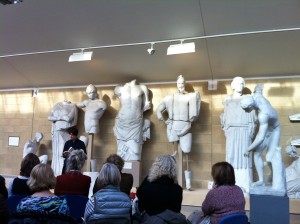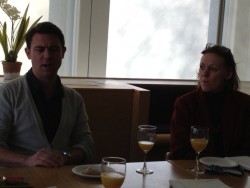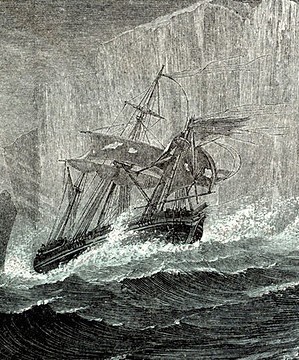Live stream
07th May 2013 | 4 Comment(s) | Fitzwilliam Museum
Live stream of Thresholds Finale event at the Fitzwilliam Museum
Live stream of Thresholds Finale event at the Fitzwilliam Museum

As a member of the audience the Threshold Project has been a surprising experience. The great Don Patterson humbly read his poems while standing behind a chair and said his favorite object in the Whipple Museum of the History of Sciences collection is an instrument that focuses on artificial horizons.
A week later at lunchtime I passed a sign in the grass saying NO LANGUAGE GAMES while walking to hear Sean Borodale read from his astounding Bee Journal at the Museum of Classical Archeology.
The next event was at the University Library at teatime with Gillian Clarke and Imtiaz Dharker both fresh from teaching a workshop with young Peterborough students who were so galvanized by the experience that they clapped enthusiastically after each poem.
The following evening was at the Fitzwilliam to hear part of the emotive dramatic poem ‘Pink Mist’ by Owen Sheers after which he mentioned that in years gone by summer sunbathing on the roof of the Fitz was a popular pastime for staff. Finally last Thursday at 6:00pm we gathered for Jo Shapcott’s compelling radio verse play ‘Erebus’ at the Polar Museum in a room with an enormous polar bear skin splayed on the wall next to a fierce sign: CAUTION Do Not Touch This Pelt.
Not only has the poetry been inspiring but the museums have come alive in new ways. All the events are free, there are many more to come, check the Thresholds website regularly.

There was a notable absence of cling film, aluminium foil and plastic lunchboxes at last Thursday’s meeting of the Fitz Book Group. Instead, the table in the Friend’s Room was laid out with a selection of shop bought sandwiches, fruit, biscuits, fruit juice and matching crockery, in readiness for the Fitz’s Poet in Residence Owen Sheers, whose (prose) novel Resistance had been our choice for February.
Resistance is, in Sheers’ own words, ‘a work of fiction set in an alternative recent history’, albeit one which, in the summer of 1940, ‘many feared to be…an all too possible future.’ Set in the Olchon Valley near Abergavenny on the Welsh border, it reimagines a 1944 in which the D-Day landings have failed and a German counter-invasion lands on British soil. The novel begins with a group of women in a remote farming community waking to find their husbands gone, and follows their lives, loves and choices in the wake of the arrival of a German patrol in the valley. The men had been recruited by the government years before, given caches of arms, and trained to sabotage German operations in the event of an invasion.
This last part is historical fact: as early as 1940, the British Government had formed the Auxiliary Units Special Duties Section – highly secret units drawn from local civilian communities, armed and trained to sabotage enemy operations. And it was stories of members from one such unit – the Monmouthshire Auxiliaries – that formed the original inspiration for Sheers’ novel. During the session, he spoke eloquently, often movingly, about how the novel had come to be written: how hearing the ‘man who ran the school bus service’ relate in a radio programme that he had been recruited into the Auxiliaries and that their working life was ‘2 weeks’ had prompted him to begin his research; how young the recruits had sometimes been – ‘one was approached when she was 14’; how they were chosen because of their knowledge of the land – ‘some of them were poachers’; of his visit to the bunkers – ‘they might have been built yesterday’; and most of all, of the importance of the land and landscape itself.
There was laughter too – such as when Sheers asked us collectively whether any of us would have destroyed a certain historical artefact that is central to the novel. The question was prompted by comments from other readers that this was not something a woman (a female character in the novel) would typically do. ‘That’s probably not a good question to ask people who work in a museum,’ a colleague eventually replied.
At the end of the session, Sheers hinted that his next novel was – a ‘contemporary… psychological thriller’, is due to be finished in April. If Resistance is anything to go by, bring it on!

Pointless, pointless, pointless. ‘All is vanity’ someone said; huh, if only. What is the point of being here if I can’t do what I’m supposed to? My whole life’s purpose – thwarted by idiots who think they know what’s attractive. I’m not supposed to be this way. I’m blind, or rather, have been blinded. Can’t [...]

Jo Shapcott’s BBC Four radio play is now available to listen and download from the link below. Erebus is the story of Sir John Franklin’s lost voyage to the Northwest Passage, told through the ghostly voices of the Ice Master, William Braine and Lady Jane Franklin. The music is composed by Jon Nicholls. If you [...]











